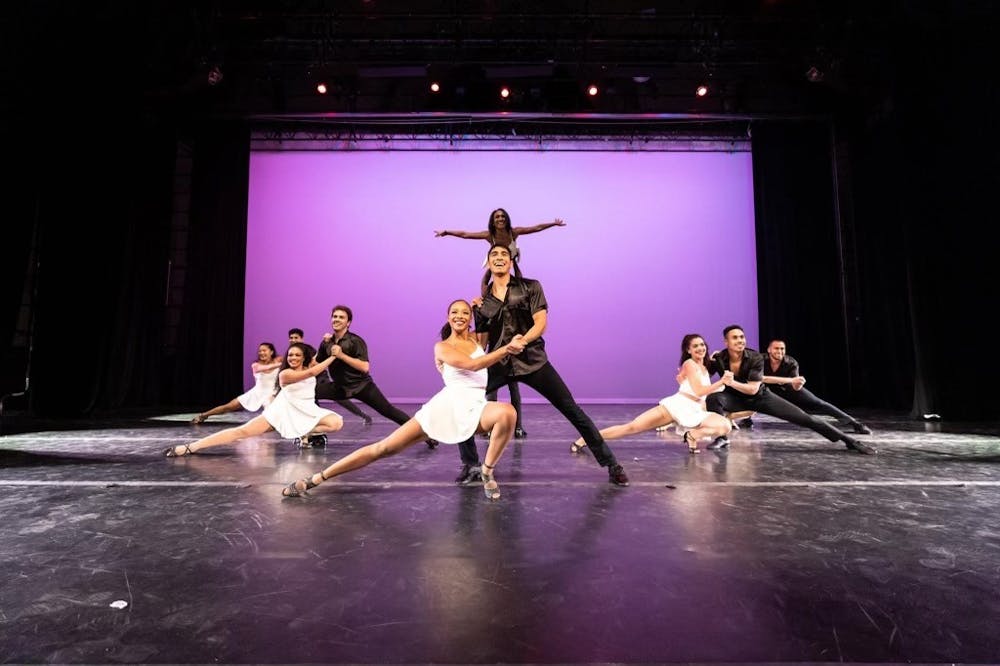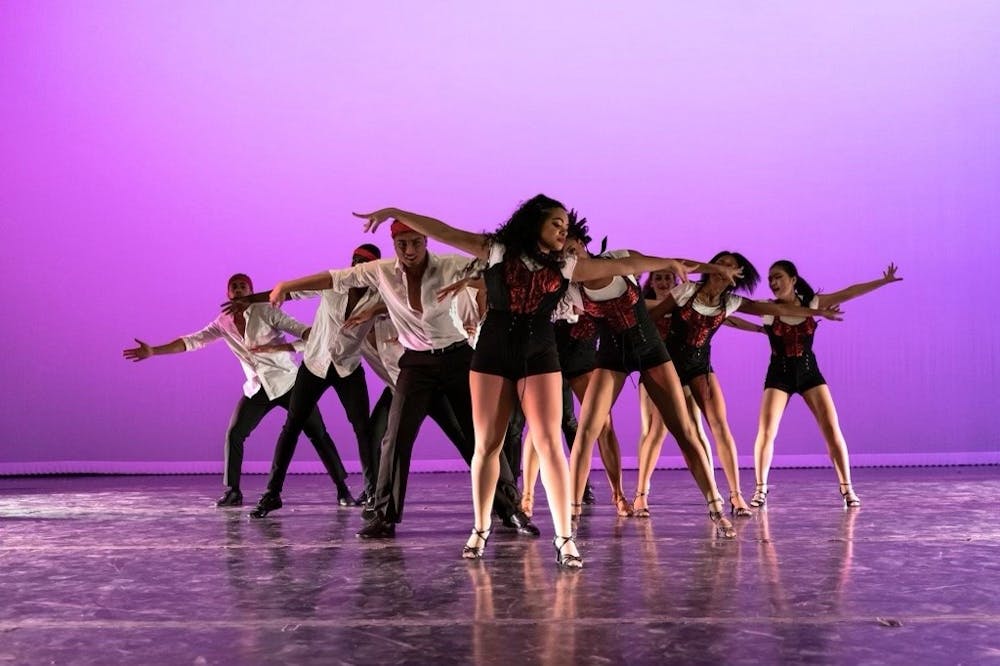At the beginning of the year, it wasn’t uncommon to see people standing still on Locust, marveling at dipping, twirling figures dancing to vibrant salsa music at all times of the day. To passersby, the performance was a gravity–defying whirlwind. For Jazmín Estevez–Rosas (C '22) and Jadel Contreras (C '22), it was just another day as part of Penn's premier Latinx dance group: the student–run, internationally recognized Onda Latina.
In Spanish, "Onda Latina" translates to "Latin Wave." It's hard to deny the momentum that the group has picked up since its inception in 1996. Starting as a small group of students seeking to entertain and educate the Penn community through dance, Onda has grown into a fixture in the Penn Latin community and the greater salsa scene. They're the only college group invited to the New York International Salsa Congress, a competition featuring groups from over 40 different countries.
At Penn, Onda regularly puts on performances in styles like salsa, bachata, merengue, tango, and more, representing the wealth of Latinx cultures.
Though group's goal is to educate the greater Philadelphia community, president Jazmín finds herself learning with each new dance.
“I’m Mexican, and many of the dances we do are more rooted in Caribbean culture, particularly dances like salsa and bachata from Puerto Rico and the Dominican Republic," she says. "It’s been interesting for me because we’re not necessarily dancing to music in styles that I grew up with, but it has kept me grounded and rooted in my culture in that I’ve been able to explore other Latinx cultures.”
The club's accomplishments speak for themselves, but to Jadel, Jazmín, and the rest of Onda’s over 40 members, it’s so much more than a dance troupe. The sense of closeness fostered by the group is, by all accounts, incomparable. Andrew Mendoza (W '24) describes the club as a family. He’s not the only one who feels this way.
“Whether it’s been a good day or a day I struggle a bit, the second I walk into a space with Onda people, it feels like none of it matters,” says Jadel. “The second we all dance together, that’s the only thing that gets my attention. For one, because I love doing it, but also because of the people. We’re all friends first, and then we also happen to come together to create beautiful shows.”

Photo courtesy of Isabela Viswanath
The alumni regularly come back for performances, sometimes even choreographing pieces for shows. When asked about their favorite Onda memory, Jadel and Jazmín were both quick to mention the incredible support of the alumni at their first show.
“Onda alumni are all over the world,” explains Jadel. “The friendships you make here make it so you’re always part of Onda, no matter where you go after. You can always come back to Philly and have a home.”
The club’s activities go beyond campus borders. Before the pandemic, Onda began hosting dance socials, which invited members of the Philadelphia Latinx community to come to campus to take lessons, watch Onda performances, and—most importantly—just dance.
Jadel and Jazmín named these socials as one of their favorite experiences with the club. They both loved the energy and enthusiasm from the crowd, and reminisced on the joy of watching older people who had come from across the city join in on the fun.
The socials reflect the spirit of Onda: a place where people of Latin American identity are united by their love of dance. While COVID–19 guidelines have put socials on hold for the foreseeable future, they will without a doubt be back.
As president, Jazmín hopes to build a more substantial presence in Philly by increasing accessibility to dance lessons. Like the majority of the club’s members, Jazmín never had formal dance training before coming to Penn. Because of the significance and prevalence of dancing in Latinx culture, she grew up dancing at parties and family events. Jadel and Andrew also joined the club based on their love of dancing in casual settings within their Latinx community at home, but both initially lacked a technical dance background.
At Onda, lack of training is not a barrier to entry. Members are selected with an approach that emphasizes commitment to the group and passion for dance as much as pure skill.
However, that’s not always the case with dance groups. “A lot of people within Black and brown communities aren’t often formally trained in dance, so when people come to auditions, obviously the people who have access to formal training will be more comfortable," says Jazmín. "Opening that opportunity up to the community to learn from us and professional instructors was really important.”
The pandemic gave Jazmín and the rest of the board the opportunity to make progress on this mission. The ease of Zoom allowed Onda to host two hours of professionally taught salsa lessons a week. The group invited Philadelphia residents and Latinx schoolchildren to take part in the learning experience alongside troupe members.
As much as Onda is a space for fun, learning, and friendship, its impact on its members is also deeply personal.
“[Joining Onda] helped me get in touch with my Latinx background, which is something that I never really did growing up,” explains Jadel. “I went to a pretty heavily white suburban high school, and this was a chance to make my family proud and connect with them a little more, in a way that I wasn’t really doing.”
When asked about the impact of Onda on his life, he recalls a show that his grandmother attended. There’s always been a language barrier between the two of them, but Jadel says that during the show, “I felt like dance was my way of communicating with her, and we were able to share something.”
Both Jazmín and Jadel are excited about the group's future, especially now that things are closer to normal with live practices and performances. Onda's first in–person show since the pandemic is fast approaching: "Alicia in Ondaland" will take place on Oct. 29 and Oct. 30 at the Iron Gate Theatre.
Whether it’s through community engagement, individual impact on members, or professional accomplishments, the Latin Wave has made quite a splash at Penn.

